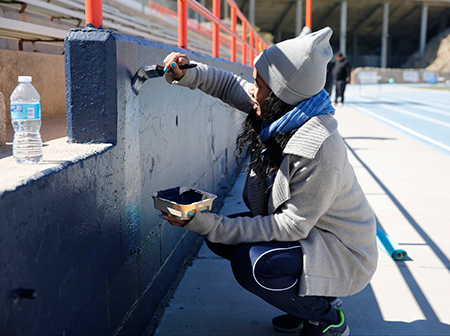UTEP-Racks Up More Than 1 Million Community Service Hours
Last Updated on September 26, 2016 at 12:00 AM
Originally published September 08, 2016
By John
UTEP Communications
Thanks to service learning courses and other volunteer service, The University of Texas at El Paso has surpassed the million-hour mark for annual community service. UTEP students reached the milestone by completing 1,115,542 community service hours between July 1, 2014 and June 30, 2015, an increase of 38 percent over the number of hours recorded the previous year.

These completed hours contribute to UTEP’s inclusion on the President’s Higher Education Community Service Honor Roll and the University’s designation as a Community-Engaged Institution by the Carnegie Foundation for the Advancement of Teaching. The service data also contribute to UTEP’s high ranking by Washington Monthly magazine, which looks at student social mobility, research and community service in ranking universities nationally.
“These data demonstrate the rich commitment of our students to the community in which they live,” said UTEP Associate Provost John Wiebe, Ph.D. “Faculty and staff members have also worked hard to create service opportunities that align with students’ studies and career objectives. As an institution, this allows us to pursue world-class educational and research programs that make an impact on both our students and on the larger community.”
The President’s Higher Education Community Service Honor Roll launched in 2006 and annually highlights the role colleges and universities play in solving community problems and placing more students on a lifelong path of civic engagement by recognizing institutions that achieve meaningful, measurable outcomes in the communities they serve.
Since 1998, the UTEP Center for Civic Engagement (CCE) has served as the link between the University and the community, fostering partnerships among the University, public schools, nonprofit organizations and social service agencies. UTEP and its community partners identify solutions to community problems and develop education opportunities for students.
The CCE has grown to be an integral part of the University’s mission toward community engagement. As such, it has increased UTEP’s capacity to engage students in the community through general volunteerism and community service, as well as academic-based service.
“The CCE is a resource to faculty, students and UTEP to help with promoting community engagement, as well as facilitating some of the service learning programming that takes place,” said Azuri Gonzalez, director of the CCE. “We assist in the identification of partners and help conceptualize engagement opportunities.”
Both service learning and other forms of community service contribute to UTEP’s overall service hours. Service learning entails community engagement that is integrated in courses and aligned with academic curricula and learning objectives.
Students who participate in academic service learning are evaluated and granted course credit. An example of this is a class on professional writing where students work with partners in the community to prepare brochures, website content and booklets to promote their missions and programs. Students learn about professional writing while serving a community organization and purpose.
The survey also taps more general community service – that which is performed for the sake of service. While learning may take place, the primary purpose is to provide a service. No academic credit is given and performance is not evaluated academically.
An example of this is volunteering at a community organization through cleaning, organizing, or helping build homes. Activities that are part of UTEP’s Project MOVE, which stands for Miner Opportunities for Volunteer Service, typically fall into this category. Project MOVE is UTEP’s annual day of community service, where more than 1,700 volunteers work on dozens of projects throughout the community at the same time.
In 2014-15, the work of 9,449 service learning students and 7,560 students who performed additional community service combined to total the more than 1 million service hours.
Students like Hector Gabriel Garcia have been involved in the community through service learning and community service either through courses at UTEP or clubs and organizations.
“At first I started doing community service very scarcely, until I found Creative Kids of El Paso on the CUE,” said Garcia, a graphic design student working as an assistant graphic designer at the CCE. “They are a nonprofit that deals in empowering youth through art education.” The CUE, or Community University Engagement system, is a CCE website that helps interested volunteers match their talents and skills with the needs of a growing number of campus and nonprofit agencies that serve the Paso del Norte region.
“I would encourage all students to volunteer should they have the chance,” Garcia said. “Look for a cause you are passionate about, enjoy yourself while you volunteer, and put your volunteer work in perspective. It can be really rewarding and fulfilling.”
Garcia also recommends students who don’t know where to start volunteering to look at the CUE. There are several opportunities available to students, from one-day commitments to internship opportunities. He also encourages students to stop by the CCE, located in Benedict Hall, Room 101 or call them at 915-747-7969.
The CCE can connect interested volunteers with a community organization that is best for them. They can also help place students in a community work-study program that partners with community organizations and allows students to be paid by the University for their service.
“Community engagement and service learning is incredibly important for the students, the faculty, the institution and the community,” Gonzalez said. “Values of reciprocity are instilled while all parties involved benefit from collaborative endeavors. Students are able to learn outside the classroom, both about academic content and application, as well as social issues, problems and activities to address them. Faculty build meaningful relationships with community partners to address social problems through research and community interventions, and the institution builds long-lasting partnerships for mutually beneficial purposes.”